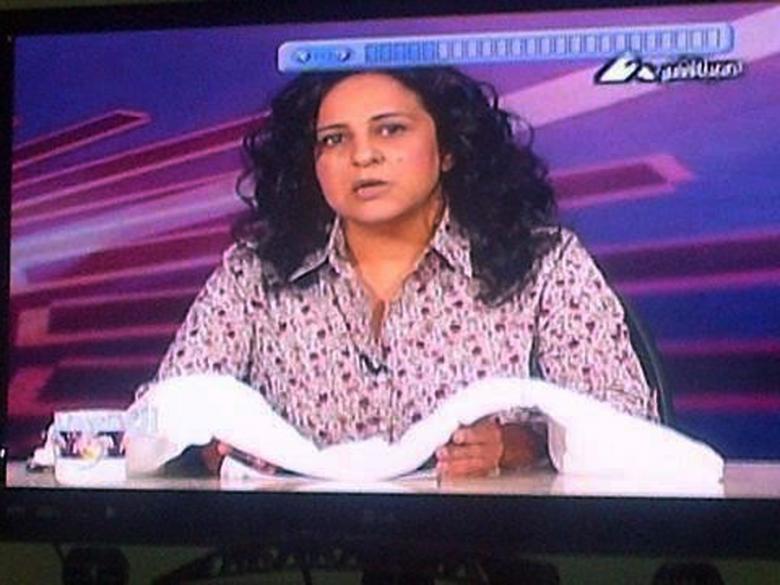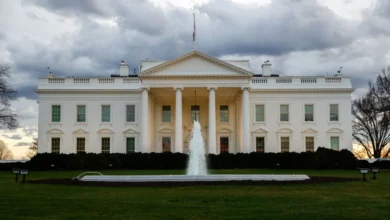
When thousands of protesters who belong to the Islamist current rallied Saturday at Cairo University to support President Mohamed Morsy’s constitutional declaration, they raised banners and chanted accusations against the media for misguiding viewers and constantly criticizing the president.
On Sunday afternoon, Information Minister and Brotherhood member Salah Abdel Maqsoud referred Hala Fahmy, a presenter of a state TV show called “Al-Dameer” (Conscience), for investigation.
The broadcast of Fahmy’s show was halted after she brought out a burial shroud on air and said she did not mind dying if that is the price for criticizing the president and the constitution, which she said suppresses freedoms and treats Egyptians as slaves.
Around the same time, news circulated of the presidency filing a lawsuit against Mahmoud Saad, prominent presenter on Al-Nahar satellite channel, and Manal Omar, a psychiatrist who appears regularly on his show.
Omar had appeared on the show on 23 November to analyze the president’s personality, diagnosing him as a “psychopath” for issuing a constitutional declaration that immunizes his decisions against legal challenges.
On Monday, Presidential spokesperson Yasser Ali confirmed that they were seeking legal action against the episode, which was “humiliating” to the president.
Both Saad and Fahmy say it is not out of the ordinary to tackle the hot topics of the hour on their programs. They say the regime’s response is a form of muzzling opposing views on state television as well as private channels.
“They have decided to get rid of all the opposing talk shows on private satellite channels. This is laughable, and it’s also a form of terrorism,” Saad tells Egypt Independent.
Fahmy says it is clear that state media is suffering just as much as private media.
“There are attempts by those in power to suppress the state media and force it to serve the interests of one political faction,” Fahmy says.
This week’s cases follow a series of recent incidents in which media personnel have come under fire for the elusive charge of insulting the president, a kind of accusation that some fear will be further cemented if the draft constitution, which is scheduled to be put to a referendum on 15 December, is passed.
Article 48 of the constitution allocates for freedom of expression, but limits it to the confines of principles of state and society, national security and public duties.
As a collective response to the developments in the media landscape, 11 private newspapers protested by not publishing their Tuesday editions, while four satellite channels planned to go dark the following day.
The striking outlets say the draft constitution represses freedoms and includes no provisions to uphold media independence or to prohibit the imprisonment of journalists.
Further, the 22 November constitutional declaration introduced the Revolution Protection Law, which rights experts say contains an article that flagrantly violates freedom of expression. Article 4 of the law delineates six chapters from the Penal Code as charges that would be referred to the newly established prosecution and specialized courts, including insulting the president, a public employee or a judge, or obstructing traffic.
Even before the recent actions against media for speaking out against the constitutional declaration, separate cases have also raised red flags for the future of media freedoms.
Last month, the Information Ministry cut the satellite feed to the privately owned satellite channel Dream TV, claiming the closure was due to procedural issues and had nothing to do with content.
Media observers, however, say the decision was a politicized reaction to the channel’s acerbic criticism of the Islamist current. The administrative judiciary ordered Dream TV back on air until the case filed by the channel’s administration against the ministry can be reviewed.
State TV’s Fahmy claims to have received calls from Ismail al-Sheshtawy, chief of the Egyptian Radio and Television Union, asking her to host leaders from the Brotherhood and its political arm, the Freedom and Justice Party, on her weekly show — a request she rejected.
Her show focuses on social issues, not politics, and Fahmy says the incident with the burial shroud may have prompted the information minister to use it as an excuse to take her off the air.
State-run TV was slammed for being the mouthpiece of the former regime and, more furiously, for its biased coverage of the 25 January revolution that ousted President Hosni Mubarak. The practice of belittling the protests was a policy that largely continued under the subsequent rule of the Supreme Council of the Armed Forces.
Fahmy says the same policy of wooing the regime in power continues. Even though several top leaders in the media are not Brotherhood members, they are toadying up to the Brotherhood minister by presenting the group in a favorable light.
As for privately owned media, Saad says the battle has other dimensions.
“Why is the presidency suing the channel, while I, as the presenter of the show, choose my guests?’’ asks Saad who at one point supported Morsy’s presidential campaign.
“There is only one answer: They want to [indirectly send a] warning to other presenters and the channel’s administration that they will be sued if they criticize those in power,” says Saad.
This piece was translated from Arabic by Dina Zafer.
This piece appears in Egypt Independent's weekly print edition.



